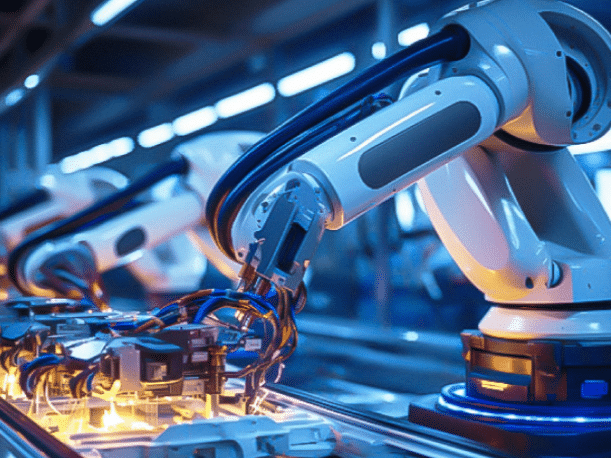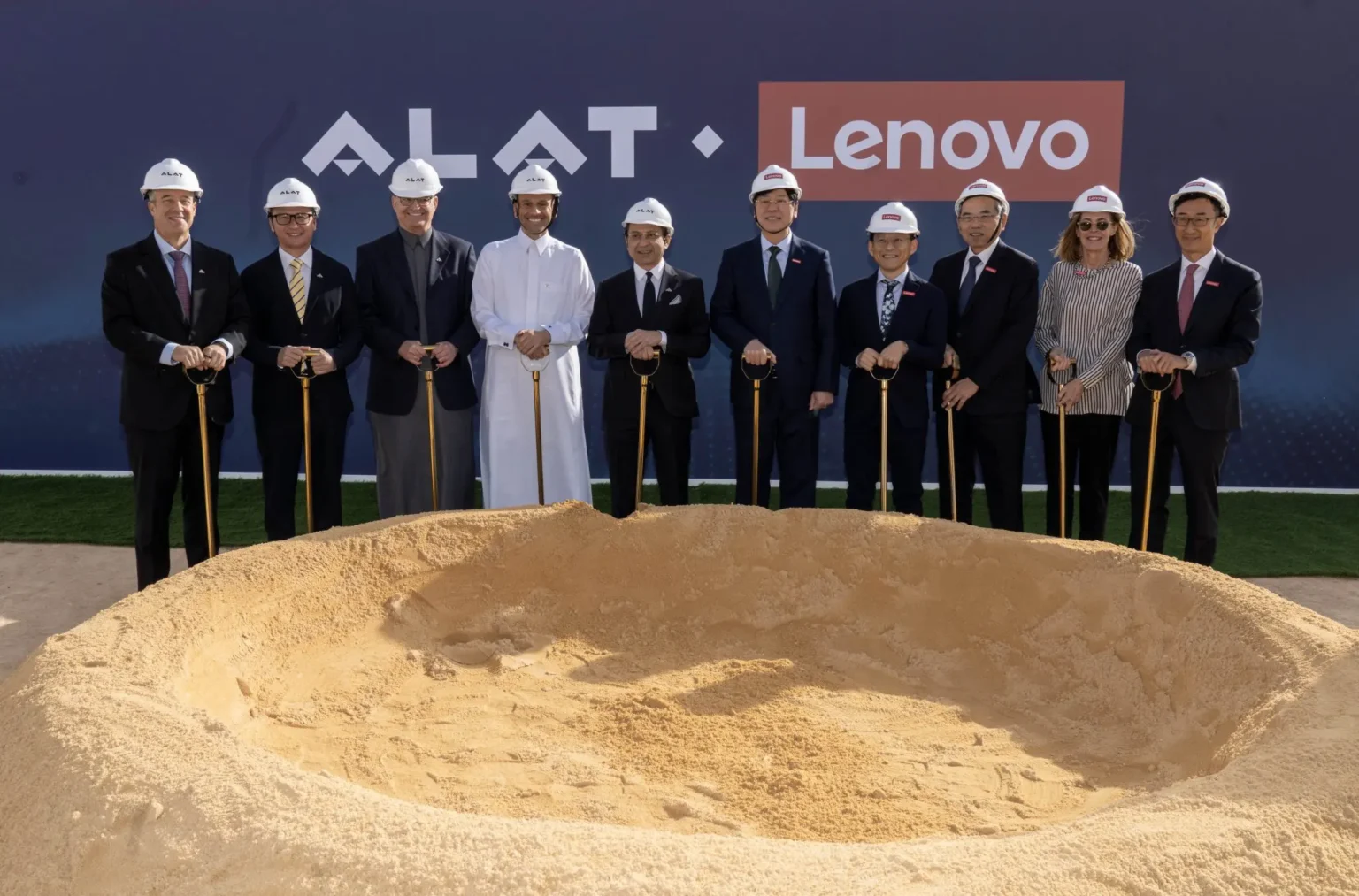In a significant move to bolster technological manufacturing in the Middle East, Alat and Lenovo have commenced construction on a new manufacturing facility in Riyadh, Saudi Arabia. This collaboration aims to produce millions of “Saudi Made” laptops, desktops, and servers, aligning with Saudi Arabia’s Vision 2030 objectives. The new plant is expected to boost the country’s economy, generate tens of thousands of jobs, and position Saudi Arabia as a key player in global technology manufacturing.
Strategic Partnership Details
The partnership between Alat, a company under Saudi Arabia’s Public Investment Fund (PIF), and Lenovo, a global technology leader, was solidified through a $2 billion investment. This deal was finalized through three-year zero-coupon convertible bonds, ensuring both parties’ commitment to the region’s long-term technological advancement. The investment was completed on January 8, 2025, after receiving all necessary shareholder and regulatory approvals.

The agreement includes two major aspects: the establishment of Lenovo’s Middle East and Africa (MEA) regional headquarters in Riyadh and the construction of a state-of-the-art manufacturing hub in Saudi Arabia. This move not only strengthens Lenovo’s presence in the Middle East but also aligns with Alat’s mission to develop advanced industrial and technology ecosystems in the Kingdom.
Facility Specifications and Production Plans
The upcoming manufacturing hub will cover an impressive 200,000 square meters within the “Riyadh Integrated” area, operated by the Special Integrated Logistics Zone (SILZ). This strategic location, just 15 minutes from Riyadh’s King Khalid International Airport, is set to enhance the efficiency of production and distribution. With this location, Lenovo can streamline supply chains and improve logistics capabilities for the entire MEA region.
The facility is scheduled to begin production in 2026. It will be equipped with cutting-edge technology to manufacture laptops, desktops, and servers that cater to global and regional demands. Furthermore, the plant will be built with sustainability at its core, incorporating energy-efficient systems and eco-friendly manufacturing processes. The project underscores the Kingdom’s efforts to integrate sustainability into its economic and industrial developments.
Economic and Employment Impact
The establishment of this manufacturing facility is expected to create a significant number of employment opportunities. Projections indicate that the factory will generate up to 15,000 direct jobs, with an additional 45,000 indirect jobs linked to the broader supply chain and related industries. This will provide a major boost to the Kingdom’s workforce, particularly in sectors such as engineering, logistics, and technology development.
In addition to job creation, the facility is expected to contribute up to $10 billion to Saudi Arabia’s non-oil GDP by 2030. This aligns with Vision 2030’s core mission of reducing dependence on oil revenue and diversifying the Kingdom’s economy. The plant’s success will pave the way for further investments in advanced technology industries, helping to establish Saudi Arabia as a leading hub for electronics manufacturing in the region.
Enhancing Global Supply Chain and Regional Presence
Lenovo’s decision to establish this facility in Saudi Arabia is part of its broader strategy to diversify its manufacturing footprint and strengthen its global supply chain. Currently, Lenovo operates over 30 manufacturing sites worldwide, including facilities in Argentina, Brazil, China, Germany, Hungary, India, Japan, Mexico, and the United States. The addition of a Saudi-based manufacturing hub will allow Lenovo to cater more effectively to the growing demand for technology products in the Middle East and Africa.
The new facility will not only reduce reliance on external production but also improve the company’s ability to meet regional and global demand with greater speed and efficiency. With the MEA market experiencing rapid digital transformation, Lenovo aims to strengthen its supply chain flexibility while supporting local economies with high-tech job opportunities and investment.
Leadership Perspectives
Lenovo Chairman and CEO Yuanqing Yang emphasized the importance of this collaboration, stating, “Through this powerful strategic collaboration and investment, Lenovo will have significant resources and financial flexibility to further accelerate our transformation and grow our business by capitalizing on the incredible growth momentum in Saudi Arabia and the wider MEA region.”
This partnership reflects Lenovo’s commitment to establishing itself as a long-term player in the Middle Eastern market. By investing heavily in local manufacturing and regional headquarters, the company aims to solidify its position as a key technology provider in Saudi Arabia and beyond.
Amit Midha, CEO of Alat, also expressed excitement about the partnership, stating, “We are incredibly proud to become a strategic investor in Lenovo and partner with them on their continued journey as a leading global technology company.”
With strong leadership support from both companies, the project is expected to progress smoothly and deliver tangible economic and technological benefits to Saudi Arabia.
Supporting Saudi Vision 2030
The partnership between Alat and Lenovo aligns seamlessly with Saudi Arabia’s Vision 2030, a national initiative designed to transform the country’s economy through diversification and technological innovation. By fostering local manufacturing and creating job opportunities, this project directly contributes to the Kingdom’s goals of economic diversification and industrial development.
One of the primary objectives of Vision 2030 is to position Saudi Arabia as a global hub for technology and innovation. By attracting leading international companies like Lenovo to invest in local production, the country is taking major strides toward achieving this goal. The project also highlights the Kingdom’s commitment to developing an advanced industrial ecosystem capable of competing on a global scale.
Furthermore, the initiative will help nurture a highly skilled workforce by providing opportunities for local engineers, technicians, and business professionals to gain experience in high-tech manufacturing. This will ensure the long-term sustainability of the industry while enhancing the Kingdom’s reputation as a destination for global technology investment.
Future Outlook
As the facility moves toward its 2026 production target, both Alat and Lenovo are committed to ensuring it meets the highest standards of sustainability and efficiency. This collaboration not only strengthens Lenovo’s presence in the MEA region but also positions Saudi Arabia as a key player in the global technology manufacturing landscape.
Looking ahead, industry experts predict that this manufacturing facility could set the stage for further technology investments in the region. By demonstrating the potential for large-scale electronics production in Saudi Arabia, Lenovo and Alat may encourage other multinational corporations to establish operations in the Kingdom.
The project’s success could also lead to the development of complementary industries such as semiconductor manufacturing, software development, and artificial intelligence research. With Saudi Arabia investing heavily in innovation and technology, the Kingdom is well-positioned to become a major player in the global digital economy.
Conclusion
The groundbreaking of the new manufacturing facility marks a pivotal moment in the partnership between Alat and Lenovo. This venture is set to drive economic growth, create substantial employment opportunities, and support Saudi Arabia’s Vision 2030 objectives. By establishing a high-tech production hub in Riyadh, Lenovo and Alat are laying the foundation for a future where Saudi Arabia plays a central role in global technology manufacturing.
As the project progresses, all eyes will be on Saudi Arabia as it takes its place as a leader in technological innovation and industrial development. With a strong strategic vision and backing from two industry giants, the Kingdom is set to make a lasting impact on the global technology landscape.
Blatter Criticizes FIFA’s World Cup Hosting Decisions: England Overlooked, Saudi Arabia Selected



